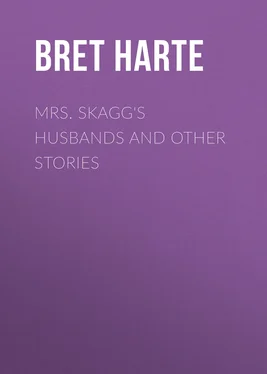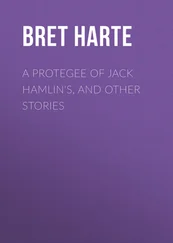Bret Harte - Mrs. Skagg's Husbands and Other Stories
Здесь есть возможность читать онлайн «Bret Harte - Mrs. Skagg's Husbands and Other Stories» — ознакомительный отрывок электронной книги совершенно бесплатно, а после прочтения отрывка купить полную версию. В некоторых случаях можно слушать аудио, скачать через торрент в формате fb2 и присутствует краткое содержание. Издательство: Иностранный паблик, Жанр: foreign_sf, literature_19, foreign_antique, foreign_prose, на английском языке. Описание произведения, (предисловие) а так же отзывы посетителей доступны на портале библиотеки ЛибКат.
- Название:Mrs. Skagg's Husbands and Other Stories
- Автор:
- Издательство:Иностранный паблик
- Жанр:
- Год:неизвестен
- ISBN:нет данных
- Рейтинг книги:3 / 5. Голосов: 1
-
Избранное:Добавить в избранное
- Отзывы:
-
Ваша оценка:
- 60
- 1
- 2
- 3
- 4
- 5
Mrs. Skagg's Husbands and Other Stories: краткое содержание, описание и аннотация
Предлагаем к чтению аннотацию, описание, краткое содержание или предисловие (зависит от того, что написал сам автор книги «Mrs. Skagg's Husbands and Other Stories»). Если вы не нашли необходимую информацию о книге — напишите в комментариях, мы постараемся отыскать её.
Mrs. Skagg's Husbands and Other Stories — читать онлайн ознакомительный отрывок
Ниже представлен текст книги, разбитый по страницам. Система сохранения места последней прочитанной страницы, позволяет с удобством читать онлайн бесплатно книгу «Mrs. Skagg's Husbands and Other Stories», без необходимости каждый раз заново искать на чём Вы остановились. Поставьте закладку, и сможете в любой момент перейти на страницу, на которой закончили чтение.
Интервал:
Закладка:
Bret Harte
Mrs. Skagg's Husbands and Other Stories
MRS. SKAGGS’S HUSBANDS
PART I—WEST
The sun was rising in the foot-hills. But for an hour the black mass of Sierra eastward of Angel’s had been outlined with fire, and the conventional morning had come two hours before with the down coach from Placerville. The dry, cold, dewless California night still lingered in the long canyons and folded skirts of Table Mountain. Even on the mountain road the air was still sharp, and that urgent necessity for something to keep out the chill, which sent the barkeeper sleepily among his bottles and wineglasses at the station, obtained all along the road.
Perhaps it might be said that the first stir of life was in the bar-rooms. A few birds twittered in the sycamores at the roadside, but long before that glasses had clicked and bottles gurgled in the saloon of the Mansion House. This was still lit by a dissipated-looking hanging-lamp, which was evidently the worse for having been up all night, and bore a singular resemblance to a faded reveller of Angel’s, who even then sputtered and flickered in HIS socket in an arm-chair below it,—a resemblance so plain that when the first level sunbeam pierced the window-pane, the barkeeper, moved by a sentiment of consistency and compassion, put them both out together.
Then the sun came up haughtily. When it had passed the eastern ridge it began, after its habit, to lord it over Angel’s, sending the thermometer up twenty degrees in as many minutes, driving the mules to the sparse shade of corrals and fences, making the red dust incandescent, and renewing its old imperious aggression on the spiked bosses of the convex shield of pines that defended Table Mountain. Thither by nine o’clock all coolness had retreated, and the “outsides” of the up stage plunged their hot faces in its aromatic shadows as in water.
It was the custom of the driver of the Wingdam coach to whip up his horses and enter Angel’s at that remarkable pace which the woodcuts in the hotel bar-room represented to credulous humanity as the usual rate of speed of that conveyance. At such times the habitual expression of disdainful reticence and lazy official severity which he wore on the box became intensified as the loungers gathered about the vehicle, and only the boldest ventured to address him. It was the Hon. Judge Beeswinger, Member of Assembly, who to-day presumed, perhaps rashly, on the strength of his official position.
“Any political news from below, Bill?” he asked, as the latter slowly descended from his lofty perch, without, however, any perceptible coming down of mien or manner.
“Not much,” said Bill, with deliberate gravity. “The President o’ the United States hezn’t bin hisself sens you refoosed that seat in the Cabinet. The ginral feelin’ in perlitical circles is one o’ regret.”
Irony, even of this outrageous quality, was too common in Angel’s to excite either a smile or a frown. Bill slowly entered the bar-room during a dry, dead silence, in which only a faint spirit of emulation survived.
“Ye didn’t bring up that agint o’ Rothschild’s this trip?” asked the barkeeper, slowly, by way of vague contribution to the prevailing tone of conversation.
“No,” responded Bill, with thoughtful exactitude. “He said he couldn’t look inter that claim o’ Johnson’s without first consultin’ the Bank o’ England.”
The Mr. Johnson here alluded to being present as the faded reveller the barkeeper had lately put out, and as the alleged claim notoriously possessed no attractions whatever to capitalists, expectation naturally looked to him for some response to this evident challenge. He did so by simply stating that he would “take sugar” in his, and by walking unsteadily toward the bar, as if accepting a festive invitation. To the credit of Bill be it recorded that he did not attempt to correct the mistake, but gravely touched glasses with him, and after saying “Here’s another nail in your coffin,”—a cheerful sentiment, to which “And the hair all off your head,” was playfully added by the others,—he threw off his liquor with a single dexterous movement of head and elbow, and stood refreshed.
“Hello, old major!” said Bill, suddenly setting down his glass. “Are YOU there?”
It was a boy, who, becoming bashfully conscious that this epithet was addressed to him, retreated sideways to the doorway, where he stood beating his hat against the door-post with an assumption of indifference that his downcast but mirthful dark eyes and reddening cheek scarcely bore out. Perhaps it was owing to his size, perhaps it was to a certain cherubic outline of face and figure, perhaps to a peculiar trustfulness of expression, that he did not look half his age, which was really fourteen.
Everybody in Angel’s knew the boy. Either under the venerable title bestowed by Bill, or as “Tom Islington,” after his adopted father, his was a familiar presence in the settlement, and the theme of much local criticism and comment. His waywardness, indolence, and unaccountable amiability—a quality at once suspicious and gratuitous in a pioneer community like Angel’s—had often been the subject of fierce discussion. A large and reputable majority believed him destined for the gallows; a minority not quite so reputable enjoyed his presence without troubling themselves much about his future; to one or two the evil predictions of the majority possessed neither novelty nor terror.
“Anything for me, Bill?” asked the boy, half mechanically, with the air of repeating some jocular formulary perfectly understood by Bill.
“Anythin’ for you!” echoed Bill, with an overacted severity equally well understood by Tommy,—“anythin’ for you? No! And it’s my opinion there won’t be anythin’ for you ez long ez you hang around bar-rooms and spend your valooable time with loafers and bummers. Git!”
The reproof was accompanied by a suitable exaggeration of gesture (Bill had seized a decanter) before which the boy retreated still good-humoredly. Bill followed him to the door. “Dern my skin, if he hezn’t gone off with that bummer Johnson,” he added, as he looked down the road.
“What’s he expectin’, Bill?” asked the barkeeper.
“A letter from his aunt. Reckon he’ll hev to take it out in expectin’. Likely they’re glad to get shut o’ him.”
“He’s leadin’ a shiftless, idle life here,” interposed the Member of Assembly.
“Well,” said Bill, who never allowed any one but himself to abuse his protege, “seein’ he ain’t expectin’ no offis from the hands of an enlightened constitooency, it IS rayther a shiftless life.” After delivering this Parthian arrow with a gratuitous twanging of the bow to indicate its offensive personality, Bill winked at the barkeeper, slowly resumed a pair of immense, bulgy buckskin gloves, which gave his fingers the appearance of being painfully sore and bandaged, strode to the door without looking at anybody, called out, “All aboard,” with a perfunctory air of supreme indifference whether the invitation was heeded, remounted his box, and drove stolidly away.
Perhaps it was well that he did so, for the conversation at once assumed a disrespectful attitude toward Tom and his relatives. It was more than intimated that Tom’s alleged aunt was none other than Tom’s real mother, while it was also asserted that Tom’s alleged uncle did not himself participate in this intimate relationship to the boy to an extent which the fastidious taste of Angel’s deemed moral and necessary. Popular opinion also believed that Islington, the adopted father, who received a certain stipend ostensibly for the boy’s support, retained it as a reward for his reticence regarding these facts. “He ain’t ruinin’ hisself by wastin’ it on Tom,” said the barkeeper, who possibly possessed positive knowledge of much of Islington’s disbursements. But at this point exhausted nature languished among some of the debaters, and he turned from the frivolity of conversation to his severer professional duties.
Читать дальшеИнтервал:
Закладка:
Похожие книги на «Mrs. Skagg's Husbands and Other Stories»
Представляем Вашему вниманию похожие книги на «Mrs. Skagg's Husbands and Other Stories» списком для выбора. Мы отобрали схожую по названию и смыслу литературу в надежде предоставить читателям больше вариантов отыскать новые, интересные, ещё непрочитанные произведения.
Обсуждение, отзывы о книге «Mrs. Skagg's Husbands and Other Stories» и просто собственные мнения читателей. Оставьте ваши комментарии, напишите, что Вы думаете о произведении, его смысле или главных героях. Укажите что конкретно понравилось, а что нет, и почему Вы так считаете.












